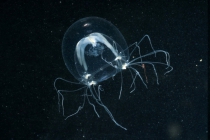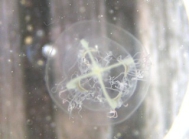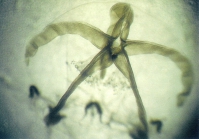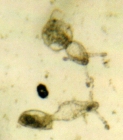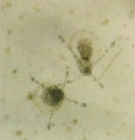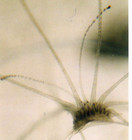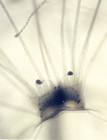Scheldt species taxon details
Nemopsis bachei L. Agassiz, 1849
117348 (urn:lsid:marinespecies.org:taxname:117348)
accepted
Species
marine, brackish, terrestrial
recent only
Agassiz, L. (1849). On the Naked-eyed Medusae of the Shores of Massachusetts in their perfect state of development (Contributions to the Natural History of the Acalephae of North America Part 1. <em>Memoirs of the American Academy of Arts and Sciences (n. s.).</em> 4: 221-312, pls 1-8., available online at https://www.biodiversitylibrary.org/page/14226050
page(s): 289, fig. 1 [details]
page(s): 289, fig. 1 [details]
Schuchert, P.; Choong, H.; Galea, H.; Hoeksema, B.; Lindsay, D.; Manko, M.; Pica, D. (2025). World Hydrozoa Database. Nemopsis bachei L. Agassiz, 1849. Accessed through: VLIZ Consortium Scheldt Species Register at: https://www.scheldemonitor.be/speciesregister/aphia.php?p=taxdetails&id=117348 on 2025-09-11
VLIZ Consortium. Scheldt Species Register. Nemopsis bachei L. Agassiz, 1849. Accessed at: https://www.scheldemonitor.nl/speciesregister/aphia.php?p=taxdetails&id=117348 on 2025-09-11
Date
action
by
original description
Agassiz, L. (1849). On the Naked-eyed Medusae of the Shores of Massachusetts in their perfect state of development (Contributions to the Natural History of the Acalephae of North America Part 1. <em>Memoirs of the American Academy of Arts and Sciences (n. s.).</em> 4: 221-312, pls 1-8., available online at https://www.biodiversitylibrary.org/page/14226050
page(s): 289, fig. 1 [details]
context source (Introduced species) Katsanevakis, S.; Bogucarskis, K.; Gatto, F.; Vandekerkhove, J.; Deriu, I.; Cardoso A.S. (2012). Building the European Alien Species Information Network (EASIN): a novel approach for the exploration of distributed alien species data. <em>BioInvasions Records.</em> 1: 235-245., available online at http://easin.jrc.ec.europa.eu [details] Available for editors
context source (Schelde) Van Ryckegem, G.; Van Braeckel, A.; Elsen, R.; Speybroeck, J.; Vandevoorde, B.; Mertens, W.; Breine, J.; De Beukelaer, J.; De Regge, N.; Hessel, K.; Soors, J.; Terrie, T.; Van Lierop, F.; Van den Bergh, E. (2016). MONEOS – Geïntegreerd datarapport INBO: Toestand Zeeschelde 2015: monitoringsoverzicht en 1ste lijnsrapportage Geomorfologie, diversiteit Habitats en diversiteit Soorten. <em>Rapport van het Instituut voor Natuur- en Bosonderzoek, INBO.R.2016.12078839. Instituut voor Natuur- en Bosonderzoek: Brussel.</em> 178 pp. (look up in IMIS) [details]
basis of record van der Land, J.; Vervoort, W.; Cairns, S.D.; Schuchert, P. (2001). Hydrozoa, <B><I>in</I></B>: Costello, M.J. <i>et al.</i> (Ed.) (2001). <i>European register of marine species: a check-list of the marine species in Europe and a bibliography of guides to their identification. Collection Patrimoines Naturels,</i> 50: pp. 112-120 (look up in IMIS) [details]
additional source Bromley; Bleakney. (1977). [details]
additional source Brunel, P., L. Bosse & G. Lamarche. (1998). Catalogue of the marine invertebrates of the estuary and Gulf of St. Lawrence. <em>Canadian Special Publication of Fisheries and Aquatic Sciences, 126.</em> 405 pp. (look up in IMIS) [details] Available for editors
additional source Calder, D. (2003). Checklist of Hydroids, hydromedusae and siphonophores reported from the Bay of Fundy. [details]
additional source Muller, Y. (2004). Faune et flore du littoral du Nord, du Pas-de-Calais et de la Belgique: inventaire. [Coastal fauna and flora of the Nord, Pas-de-Calais and Belgium: inventory]. <em>Commission Régionale de Biologie Région Nord Pas-de-Calais: France.</em> 307 pp., available online at http://www.vliz.be/imisdocs/publications/145561.pdf [details]
additional source Streftaris, N., A. Zenetos & E. Papathanassiou. (2005). Globalisation in marine ecosystems: the story of non-indigenous marine species across European seas. <em>Oceanogry and Marine Biology: an Annual Review.</em> 43: 419-453. (look up in IMIS) [details] Available for editors
additional source Shih, C.T., 1977. A guide to the Jellyfish of Canadian Atlantic waters. National Museum of Natural Sciences, Natural History Series 5 : 1-190. [details]
additional source Segura-Puertas, L., L. Celis, and L. Chiaverano. 2009. Medusozoans (Cnidaria: Cubozoa, Scyphozoa, and Hydrozoa) of the Gulf of Mexico, Pp. 369–379 in Felder, D.L. and D.K. Camp (eds.), Gulf of Mexico–Origins, Waters, and Biota. Biodiversity. Texas A&M Pre [details]
additional source Liu, J.Y. [Ruiyu] (ed.). (2008). Checklist of marine biota of China seas. <em>China Science Press.</em> 1267 pp. (look up in IMIS) [details] Available for editors
additional source Integrated Taxonomic Information System (ITIS). , available online at http://www.itis.gov [details]
redescription Schuchert, P. 2012. North-West European Athecate Hydroids and their Medusae. Synopses of the British Fauna (New Series) 59. The Linnean Society of London, London, pp. i-viii, 1-364.
page(s): 212, fig. 203 [details] Available for editors
redescription Schuchert, P. (2007). The European athecate hydroids and their medusae (Hydrozoa, Cnidaria): Filifera part 2. <em>Revue suisse de Zoologie.</em> 114: 195-396.
page(s): 235, fig. 15 [details]
page(s): 289, fig. 1 [details]
context source (Introduced species) Katsanevakis, S.; Bogucarskis, K.; Gatto, F.; Vandekerkhove, J.; Deriu, I.; Cardoso A.S. (2012). Building the European Alien Species Information Network (EASIN): a novel approach for the exploration of distributed alien species data. <em>BioInvasions Records.</em> 1: 235-245., available online at http://easin.jrc.ec.europa.eu [details] Available for editors
context source (Schelde) Van Ryckegem, G.; Van Braeckel, A.; Elsen, R.; Speybroeck, J.; Vandevoorde, B.; Mertens, W.; Breine, J.; De Beukelaer, J.; De Regge, N.; Hessel, K.; Soors, J.; Terrie, T.; Van Lierop, F.; Van den Bergh, E. (2016). MONEOS – Geïntegreerd datarapport INBO: Toestand Zeeschelde 2015: monitoringsoverzicht en 1ste lijnsrapportage Geomorfologie, diversiteit Habitats en diversiteit Soorten. <em>Rapport van het Instituut voor Natuur- en Bosonderzoek, INBO.R.2016.12078839. Instituut voor Natuur- en Bosonderzoek: Brussel.</em> 178 pp. (look up in IMIS) [details]
basis of record van der Land, J.; Vervoort, W.; Cairns, S.D.; Schuchert, P. (2001). Hydrozoa, <B><I>in</I></B>: Costello, M.J. <i>et al.</i> (Ed.) (2001). <i>European register of marine species: a check-list of the marine species in Europe and a bibliography of guides to their identification. Collection Patrimoines Naturels,</i> 50: pp. 112-120 (look up in IMIS) [details]
additional source Bromley; Bleakney. (1977). [details]
additional source Brunel, P., L. Bosse & G. Lamarche. (1998). Catalogue of the marine invertebrates of the estuary and Gulf of St. Lawrence. <em>Canadian Special Publication of Fisheries and Aquatic Sciences, 126.</em> 405 pp. (look up in IMIS) [details] Available for editors
additional source Calder, D. (2003). Checklist of Hydroids, hydromedusae and siphonophores reported from the Bay of Fundy. [details]
additional source Muller, Y. (2004). Faune et flore du littoral du Nord, du Pas-de-Calais et de la Belgique: inventaire. [Coastal fauna and flora of the Nord, Pas-de-Calais and Belgium: inventory]. <em>Commission Régionale de Biologie Région Nord Pas-de-Calais: France.</em> 307 pp., available online at http://www.vliz.be/imisdocs/publications/145561.pdf [details]
additional source Streftaris, N., A. Zenetos & E. Papathanassiou. (2005). Globalisation in marine ecosystems: the story of non-indigenous marine species across European seas. <em>Oceanogry and Marine Biology: an Annual Review.</em> 43: 419-453. (look up in IMIS) [details] Available for editors
additional source Shih, C.T., 1977. A guide to the Jellyfish of Canadian Atlantic waters. National Museum of Natural Sciences, Natural History Series 5 : 1-190. [details]
additional source Segura-Puertas, L., L. Celis, and L. Chiaverano. 2009. Medusozoans (Cnidaria: Cubozoa, Scyphozoa, and Hydrozoa) of the Gulf of Mexico, Pp. 369–379 in Felder, D.L. and D.K. Camp (eds.), Gulf of Mexico–Origins, Waters, and Biota. Biodiversity. Texas A&M Pre [details]
additional source Liu, J.Y. [Ruiyu] (ed.). (2008). Checklist of marine biota of China seas. <em>China Science Press.</em> 1267 pp. (look up in IMIS) [details] Available for editors
additional source Integrated Taxonomic Information System (ITIS). , available online at http://www.itis.gov [details]
redescription Schuchert, P. 2012. North-West European Athecate Hydroids and their Medusae. Synopses of the British Fauna (New Series) 59. The Linnean Society of London, London, pp. i-viii, 1-364.
page(s): 212, fig. 203 [details] Available for editors
redescription Schuchert, P. (2007). The European athecate hydroids and their medusae (Hydrozoa, Cnidaria): Filifera part 2. <em>Revue suisse de Zoologie.</em> 114: 195-396.
page(s): 235, fig. 15 [details]
 Present
Present  Inaccurate
Inaccurate  Introduced: alien
Introduced: alien  Containing type locality
Containing type locality
| Language | Name | |
|---|---|---|
| Dutch | Bache's knotsklokje | [details] |
| English | clinging jellyfishAmerican brackish water medusa | [details] |
To Barcode of Life (15 barcodes)
To Biodiversity Heritage Library (28 publications)
To European Nucleotide Archive, ENA (Nemopsis bachei)
To GenBank (87 nucleotides; 32 proteins)
To Information system on Aquatic Non-Indigenous and Cryptogenic Species (AquaNIS)
To Niet-inheemse soorten Belgisch deel Noordzee en aanpalende estuaria (in Dutch)
To PESI
To USNM Invertebrate Zoology Cnidaria Collection (245 records)
To ITIS
To Biodiversity Heritage Library (28 publications)
To European Nucleotide Archive, ENA (Nemopsis bachei)
To GenBank (87 nucleotides; 32 proteins)
To Information system on Aquatic Non-Indigenous and Cryptogenic Species (AquaNIS)
To Niet-inheemse soorten Belgisch deel Noordzee en aanpalende estuaria (in Dutch)
To PESI
To USNM Invertebrate Zoology Cnidaria Collection (245 records)
To ITIS
